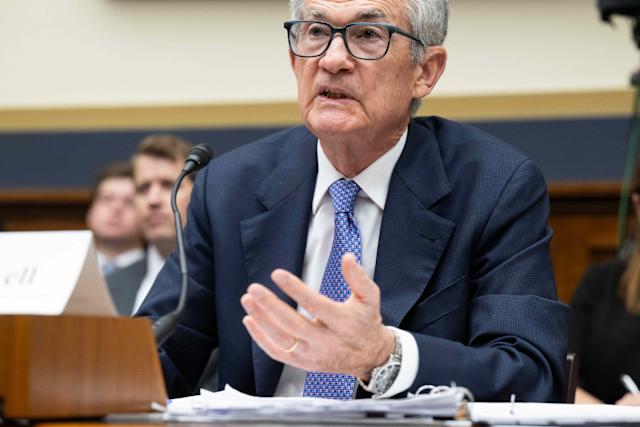Fed Chair Powell Stands Firm on Wait-and-See Approach to Rate Cuts Amid Trumps Pressure for Lower Interest Rates
Federal Reserve Chair Jerome Powell defended the central bank's high interest rate policy before Congress on Tuesday, reiterating his stance that the Fed needs to know what President Donald Trump's final tariff policy will be and how it will impact the economy before committing to cutting borrowing costs.

Powell has resisted Trump's demands to cut interest rates, saying that Trump's tariffs risk pushing up inflation. In prepared remarks, Powell told the House Finance Committee that the Fed will continue to hold rates flat until officials have a better idea of what Trump's tariff policy will be and how it will affect consumer prices.
The Fed has been holding the rate at a higher-than-usual level all year to snuff out the last of the post-pandemic inflation flare-up. Powell's testimony was the latest action in an increasingly heated conflict between Powell and Trump over interest rates.
Trump has repeatedly demanded the Fed cut rates sharply, pointing to recent economic data showing that inflation has been relatively tame in recent months. However, the Federal Reserve is not under presidential control, and Fed officials have been reluctant to cut interest rates despite Trump's insult-filled threats on social media and in interviews.
Powell's testimony highlighted the fact that Trump's trade policy hasn't settled on long-term tariff levels, clouding the economic outlook. Several tariff-related deadlines are approaching, including Trump's July 9 deadline for trading partners to negotiate lower trade barriers to avoid the double-digit "reciprocal" tariffs he announced on Liberation Day.
Powell emphasized that if people expect inflation to accelerate, they'll behave in ways that cause inflation, a kind of self-fulfilling prophecy. The Fed has sought to keep inflation in check, but surveys show businesses and consumers are bracing for tariff-related inflation.
Powell's stance diverged from at least two other members of the Fed's rate-setting committee. Fed Governor Christopher Waller said last week that he was leaning towards a rate cut as soon as July, and Governor Michelle Bowman made similar comments Monday. Powell said rate cuts were still on the table if inflation stays tame, but did not endorse a cut at the Fed policy committee's next meeting, scheduled for July. A downturn in the job market could also increase the pressure on the Fed to cut rates, but the unemployment rate has stayed low in recent months. The Fed's "dual mandate" from Congress requires the central bank to manage inflation and keep unemployment low at the same time.
Powell reiterated that if inflation pressures remain contained, then the Fed will consider cutting rates sooner rather than later, but he emphasized that there is no need to rush as the economy is still strong.
The sturdiness of Fed Chair Powell's adherence to the wait-and President Trump’ssremarks, serves as a reminder that it is often necessary for central bankers like him burdened with arduous decisions amid external pressures.
In the face of Trump's vocal urgings for lower interest rates, Fed Chair Powell remains steadfast in his 'wait-and-'see approach', signaling a measured response from monetary policy to navigate uncertainty.
Jerome Powell's denouncement of a 'wait-and-'see approach despite Donald Trump’ pressuring him for interest rate cuts, illustrates the birocratic loyalties and careful policy making that is often required in times like these.
Powell's resolute stance on a wait-and-see approach to interest rate cuts exemplifies sound central bank leadership under Trump pressure, ensuring fiscal prudence amidst the economic landscape uncertainty.
椅耶伦打的那场关于利率计算方法的官司大得不能再大了。
Fed Chair Powell's steadfast adherence to the 'wait-and–see approach,' in spite of mounting pressure from Trump for lower interest rates, exemplifies his commitment and independence as a central banker focused on maintaining economic stability.














